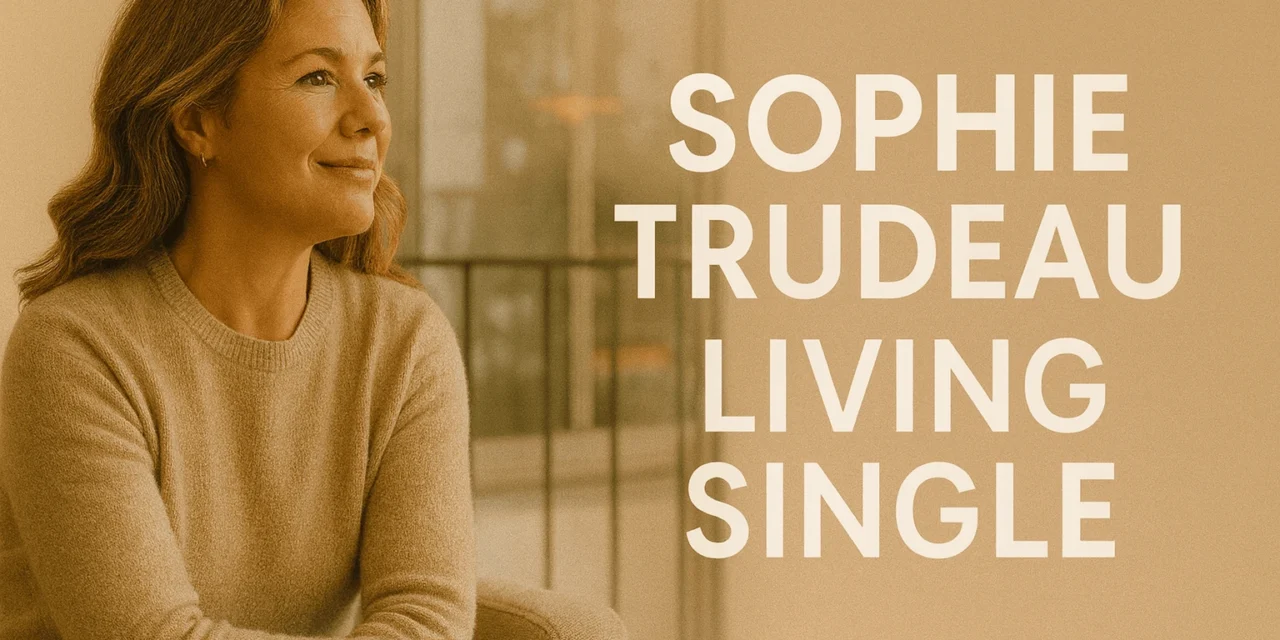In our last post, we explored the public unraveling of partnerships and being single— from Katy Perry’s independence to Justin Trudeau’s solo chapter — and what those shifts reveal about the modern landscape of connection.
Today, we turn our gaze to Sophie Grégoire Trudeau: mother, author, advocate, and now — quietly, powerfully — a woman redefining what it means to stand in her own light.
Her journey since separating from Canada’s Prime Minister isn’t about scandal or spectacle. It’s about sovereignty — the slow, deliberate reclaiming of one’s emotional and spiritual home.
It’s about what happens when a woman decides that her wholeness is no longer negotiable.
Table of Contents
The Starting Point: From “Spouse Of” to “Self As”
For nearly two decades, Sophie Grégoire Trudeau’s identity was woven tightly into her husband’s public life. It’s a familiar story, especially to women who’ve spent years orbiting someone else’s dream. As Dave Chapelle says, someone else has a bigger dream, and you are just living in it. Titles like wife, mother, partner, and host become the scaffolding and framing of a life. And then, one day, you realize: you’ve been living inside someone else’s narrative, inside someone else’s dream. The role of first lady cannot be understated; it is integral and important; however, Sophie is now stepping into her own light and shining.
Sophie’s book Closer Together reflects this reckoning. She writes about the importance of self-awareness, not as a trendy buzzword, but as a survival tool. Solo living begins exactly here: not with logistics, not with loneliness, but with self-inquiry, self-reflection, and self-awareness.
It’s the moment you stop asking, “Who am I to do this alone?” and start asking, “Who am I if I don’t?” Going alone can be the bravest step to truly not being lonely. If you truly have yourself, you will never be alone.
In this way, solo living becomes a radical act of presence. It’s a homecoming to your own inner voice after years of noise. Sophie’s story reminds us that this phase of life, “he after” is often where the real becoming begins.
The Pivot: Separation as a Sacred Transition
When Sophie and Justin Trudeau announced their separation, the world held its collective breath. But rather than lean into bitterness, Sophie leaned into grace. She reframed separation not as loss, but as a sacred transition, one that can deepen compassion, honesty, and independence.
Many of us who choose solo living do so after a rupture in our lives: a breakup, a divorce, a turning point. Yet, the transition can be fertile ground for personal transformation.
It’s where we learn to sit with discomfort rather than rush to fill it.
It’s where solitude becomes a teacher rather than a punishment.
Sophie spoke of “parallel paths,” describing a relationship that continues through respect and shared purpose, even as personal paths diverge. That’s the essence of conscious uncoupling, the idea that endings can be handled with integrity and respect, not destruction.
For solo livers and solo lovers, this perspective is gold. You can end something with love, walk away without anger, and still wish the other person well.
That kind of maturity doesn’t just heal relationships; it heals your relationship with yourself. Your relationship with yourself is sacred, and how you treat others often reflects how you treat yourself.
The New Trajectory: Self-Discovery as Public Service
In the months following her separation, Sophie didn’t retreat into invisibility; she simply recalibrated. While JT was galivanting on yachts, being snapped at events by paps, Sophie was quietly rising.
Her life’s work now orbits around emotional literacy, trauma awareness, and connection. Hosting a public seminar with Dr. Gabor Maté, she’s diving deep into the terrain of healing, exploring how our childhood patterns shape our adult choices and how the nervous system stores the stories we never spoke aloud.
For the solo traveler — whether literal or emotional — this is the work beneath the surface.
Solo living isn’t just about learning to cook for one or decorate a smaller space; it’s about meeting the parts of yourself you abandoned along the way.
It’s about making peace with the quiet and understanding that your worth doesn’t expand or contract based on who shares your bed.
Sophie’s trajectory models a kind of public self-love — showing that it’s not indulgent to center yourself. It’s necessary. When you cultivate self-awareness, you stop outsourcing your peace. You stop waiting to be chosen and start consciously choosing yourself.
Why Her Journey Resonates with the Sustainably Single Life
1. Redefining Success and Identity
For years, success meant having the picture-perfect family, the visible role, and the accolades. Sophie’s new path shows that sometimes success looks like softening. It looks like early mornings in silence, writing again, teaching yoga, and reconnecting with nature.
Solo living isn’t a demotion from partnership — it’s a promotion to authenticity.
It’s the realization that your value doesn’t diminish when someone leaves; in fact, it multiplies when you begin to see yourself clearly.
2. Boundaries and Connection
Sophie’s phrase “parallel paths” captures something powerful: you can love others deeply and still belong to yourself completely. Solo living teaches that healthy boundaries are not barriers — they’re bridges. They allow connection without self-erasure.
To be sustainably single is to understand that you can share energy without giving it away. You can be available to love without abandoning yourself to it.
3. Emotional Literacy and Inner Work
Sophie’s collaboration with Dr. Maté underscores a truth many discover in solitude: healing isn’t found in distraction.
When you live alone, the silence can feel heavy at first — until it becomes a mirror. That’s when you start listening to your body, noticing your triggers, and learning to self-regulate.
Self-improvement, then, isn’t about “fixing” what’s broken — it’s about nurturing what’s already whole.
Solo living becomes a daily practice of self-parenting: feeding yourself well, speaking kindly to your reflection, and forgiving your own evolution.
4. Reinvention Through Reflection
Every reinvention starts with a pause. Sophie’s reinvention isn’t loud — it’s rooted in reflection, truth-telling, and spiritual humility.
The solo path invites us all to slow down long enough to hear our own wisdom.
To live sustainably single is to ask: What do I actually want my life to feel like?
When you stop performing and start living from alignment, even solitude feels full.
In a way, the stories of all the players in this juicy headline-Katy, Justin, and Sophie form a constellation of the same lesson: that identity, love, and belonging are not fixed states, but rather evolving and changing landscapes. Katy leaned into independence and motherhood outside the traditional script after her divorce. Justin has stepped into his public solo journey beyond his political identity, with a softer, more self-oriented perspective. And Sophie is forging a new path that blends authorship, emotional literacy, and conscious self-work. None of these paths is about “ending” a relationship — they are about expanding the definition of love to include oneself, the ultimate relationship. This is the heart of sustainable single living: the understanding that life is not a binary between partnered and alone, but an ongoing relationship with our own growth. We choose ourselves without closing the door to possibilities and connections. And we honor the truth that the most meaningful relationship we will ever have is the one we build inside our own skin. Their stories remind us that the solo chapter is not the aftermath; it is the beginning and becoming of your highest self.

